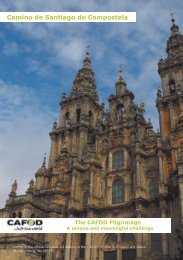Confirmation - Roman Catholic Diocese of Portsmouth
Confirmation - Roman Catholic Diocese of Portsmouth
Confirmation - Roman Catholic Diocese of Portsmouth
You also want an ePaper? Increase the reach of your titles
YUMPU automatically turns print PDFs into web optimized ePapers that Google loves.
Meet: the person and their family to get to know them and make a list <strong>of</strong> their gifts and<br />
needs. If possible, become familiar with the methods used to teach them at school (talk to the<br />
teacher and learning support assistant).<br />
Explore: be creative in making the formation process accessible. Each session should have<br />
only one clear message for the person with learning difficulties.<br />
Explain: by transforming the message into symbolic activity (song, picture, symbol cards,<br />
drama, story bag, etc — contact the Department for Pastoral Formation for help in this area) .<br />
Transcend: engage with the whole group in a liturgical activity so that each person moves on<br />
in their faith, not alone but as a part <strong>of</strong> a bigger community.<br />
Parents with learning difficulties may also need special help and support. The Department’s<br />
Advisor for Marriage and Family Life can assist, and there is much material available online.<br />
2. Safeguarding<br />
(Much <strong>of</strong> the material in this section is taken from or based on the Diocesan Safeguarding Resource Pack)<br />
“The <strong>Catholic</strong> Church <strong>of</strong> England and Wales, the Bishops and Congregational Leaders are<br />
committed to safeguarding as an integral part <strong>of</strong> the life and ministry <strong>of</strong> the Church.” (National<br />
Safeguarding resource pack)<br />
In the following section, for “leader” read “catechist” as appropriate.<br />
Checklist for good practice<br />
Ensure that there are a minimum <strong>of</strong> two leaders always present. In groups <strong>of</strong> more than 20<br />
there should be one additional leader for every 10 (or part <strong>of</strong> 10) young people, maintaining<br />
the balance <strong>of</strong> gender.<br />
For First Holy Communion preparation, the same ratio <strong>of</strong> adults to children is required as<br />
for Liturgy <strong>of</strong> the Word with Children — i.e. there must always be at least two leaders over<br />
the age <strong>of</strong> 18, but with more than 8 children there needs to be an additional adult helper for<br />
every 8 children.<br />
Leaders <strong>of</strong> the same gender as the young people need to be present. All volunteers should<br />
have completed the necessary CRB checks and have clearly defined roles.<br />
Leaders need to think and act carefully to avoid situations which could lead to difficulties <strong>of</strong><br />
embarrassment, accusations or temptations. For example, a leader should never be alone<br />
with a young person.<br />
All leaders should be familiar with safeguarding guidelines and procedures and know what<br />
to do in the case <strong>of</strong> suspected or alleged abuse. If in any doubt, contact the parish<br />
Safeguarding Representative or the diocesan Safeguarding Office.<br />
The leader should ensure that there is adequate insurance cover, in particular for activities<br />
away from the normal meeting place.<br />
Keep a register <strong>of</strong> young people attending, keep session records and complete any incident<br />
forms if necessary.<br />
12
















